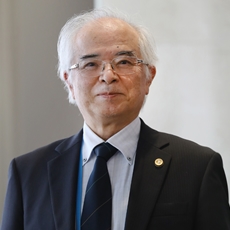
By Etsuro Totsuka
International human rights lawyer
The Japanese government's decision to release contaminated water stored at the Fukushima nuclear power plant into the sea is highly problematic from a legal perspective. This is a look at this decision from the perspective of international laws on the sea and human rights.
Article 192 of the United Nations Convention on the Law of the Sea (UNCLOS) says, "States have the obligation to protect and preserve the marine environment." The (a) section of Clause 3, Article 194, discusses necessary measures to minimize the leak of polluting substances, saying, "The measures taken pursuant to this Part shall deal with all sources of pollution of the marine environment. These measures shall include, inter alia, those designed to minimize to the fullest possible extent."
As such, UNCLOS requires all countries to take measures to prevent the seas and oceans from being contaminated. In short, this means leaking polluted water containing radioactive materials into the sea is a violation of international marine law.
The Korean government can take up this matter with the International Tribunal for the Law of the Sea to demand that Japan retract its decision. The issue is what the tribunal considers pollution. The Japanese government argues that it sees no problem in dumping the water into the sea given that the water is within the permissible release standard, adding that its neighbors Korea and China also release radioactive water.
Tokyo has shown a unilateral stance toward its neighbors and the Japanese people. Japan must plan the release of the contaminated water and its implementation within the effective framework of global management with the participation of the International Atomic Energy Agency, the World Health Organization and the interested parties Korea and China. In addition, Japan must unveil the entire process in a transparent and sincere manner or incur international criticism for illegally dumping polluted water.
The United Nation Human Rights Council also expressed "deep regret" over the Japanese government's decision. The Japanese daily Asahi Shimbun on April 16 said three U.N. human rights experts released an emergency statement expressing deep regret over the planned dumping.
The U.N. body warned that the discharge of polluted water "could impact millions of lives and livelihoods in the Pacific region" and "impose considerable risks to the full enjoyment of human rights of concerned populations in and beyond the borders of Japan."
U.N. human rights experts added that the advanced liquid processing system (ALPS) "failed to completely remove radioactive concentrations in most of the contaminated water stored in tanks at the Fukushima Daiichi plant," adding, "A first application ALPS failed to clean the water below regulatory levels and there are no guarantees that a second treatment will succeed."
The UNHRC also said, "We remind Japan of its international obligations to prevent exposure to hazardous substances, to conduct environmental impact assessments of the risks that the discharge of water may have, to prevent transboundary environmental harms, and to protect the marine environment." This means the dumping is related not only to international law on the oceans, but also that on human rights such as the U.N. Charter and international human rights treaties.
To mark World Environment Day on June 5 and Maritime Day on June 8, about 70 U.S. civic groups such as the Manhattan Project for a Nuclear-Free World sent a joint letter to Japan opposing the release of contaminated water from the Fukushima nuclear plant. The letter said, "Polluted water from Fukushima is fundamentally different from that coming from a regular nuclear power plant." Calling the release "a violation of the London Protocol designed to prohibit the dumping of radioactive materials into the sea, at any concentration," the groups urged Japan to cancel its planned dumping.
The Japanese government must faithfully observe international law and refrain from polluting the oceans with radioactive materials. This is the duty of all human beings. And this is not the only issue. Japan plans to demolish the Fukushima plant by 2051 but has unveiled no details on how. Melted nuclear fuel remains inside the reactor that exploded during the 2011 earthquake that hit eastern Japan. The immense quantity of water used every day to cool the reactor produces even more polluted water.
The release of polluted water is just one procedure in the removal of a nuclear reactor. We must push for a nuclear-free policy before the next disaster takes place. This era is when we can utilize and live with other safe energy sources such as solar, water, wind and hydrogen without relying on fossil fuels or nuclear power. We need a transformation in renewable energy without depending on nuclear power. Korea, Japan and China should conduct a joint study on this and share the results.
Translated by Korea.net staff writer Yoon Sojung
Most popular
- 2 Egyptian sisters reflect on 10 years as Honorary Reporters
- Korea Welcome Week for foreign tourists set from April 25-May 16
- Actor Bae Doona's first romcom in decade to hit theaters in May
- Korea.net welcomes 2025 K-influencers, Honorary Reporters
- 2025 Honorary Reporter class pledges to spread 'real Korea' worldwide
